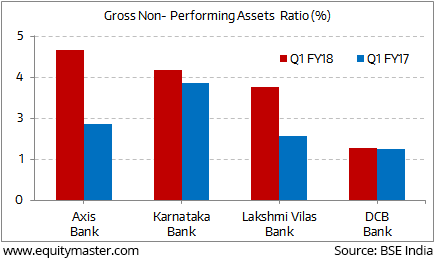- Home
- Todays Market
- Indian Stock Market News December 13, 2017
Sensex Trades on a Volatile Note; Realty Stocks Top Losers Wed, 13 Dec 01:30 pm
After opening the day in red, share markets in India witnessed choppy trading activity and are presently trading in above the dotted line. Sectoral indices are trading on a mixed note, with stocks in the consumer durables sector and stocks in the energy sector witnessing maximum buying interest. While stocks in the realty sector are leading the losses.
The BSE Sensex is trading up by 145 points (up 0.4%) and the NSE Nifty is trading up by 48 points (up 0.5%). Meanwhile, the BSE Mid Cap index is trading up by 0.2%, while the BSE Small Cap index is trading up by 0.3%. The rupee is trading at 64.82 to the US$.
In news from stocks in the banking sector. Banks are set to refer about 23 of the 28 stressed accounts identified by the Reserve Bank of India (RBI) to the National Company Law Tribunal (NCLT).
Bankers are looking to speed up the resolution of 28 accounts including Videocon Industries, Jaiprakash Associates as the RBI's deadline ends today.
In June, RBI directed banks to immediately refer 12 large cases to NCLT for resolution. In the last week of August, it released a second list of 28 companies but gave banks time to resolve the loans before resorting to the tribunal. However, if the banks fail to recast them by December 13, they have to refer the cases to NCLT by December 31.
The accounts need to be restructured by December 13 or they'll end up in the NCLT for the next step in the insolvency process. At that point, banks will have to provide for losses of up to 50% of the loan value, hitting their earnings.
Asset Quality Deteriorates Further for Banks
If the trend of rising bad loans continues, there's a painful road ahead for the banking sector. The RBI expects the average GNPA ratio to increase to 10.2% by March 2018. It indicated that if macroeconomic conditions worsen, this number could go up.
Although RBI is showing urgency in tackling the NPA issue, a lot more needs to be done by lenders too to stop the rot.
Moving on to news about the economy. The Asian Development Bank (ADB) lowered India's GDP forecast for the current fiscal by 0.3% to 6.7 %, attributing it to tepid growth in the first half, demonetisation and transitory challenges of tax sector reforms.
It has also revised downward the gross domestic product (GDP) outlook for next fiscal beginning from March 2018 to 7.3% from 7.4% mainly due to rising global crude oil prices and soft growth in private sector investment.
Rising oil prices do not bode well for the Indian economy, because India is hugely dependent on petroleum imports. India is the world's third-largest oil consumer. And energy consumption in India is set to grow as our economy remains one of the few 'bright spots' in a slowing, aging world economy. And India could face a potent risk with a rise in crude oil prices.
The ADB said that by region, South Asia will remain the fastest growing region in Asia Pacific, even after the bank cut its 2017 forecast to 6.5% from 6.7%, with India's growth outlook lowered to 6.7% from 7.0%.
ADB however, expects growth to pick up in remaining two quarters of 2017-18 as the government is implementing measures to ease compliance with the new Goods and Services Tax (GST) as well as bank recapitalisation.
For information on how to pick stocks that have the potential to deliver big returns, download our special report now!
Read the latest Market Commentary



Equitymaster requests your view! Post a comment on "Sensex Trades on a Volatile Note; Realty Stocks Top Losers". Click here!
Comments are moderated by Equitymaster, in accordance with the Terms of Use, and may not appear
on this article until they have been reviewed and deemed appropriate for posting.
In the meantime, you may want to share this article with your friends!